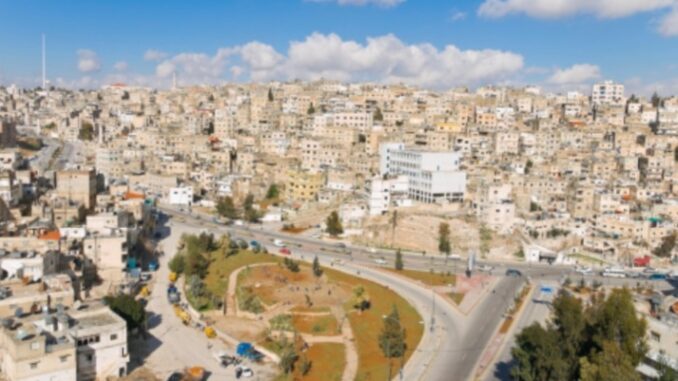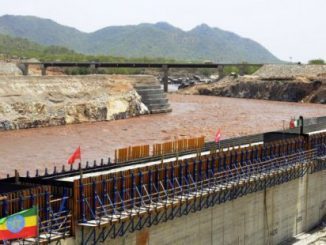
Debt-ridden Jordan is following Egypt’s lead by planning a new administrative capital in the desert near Amman while Jordanians are struggling in the kingdom’s wheezing economy.
Jordan’s King Abdullah has recently told Jordanian ministers to set clear timetable for the construction of a new administrative capital in the desert near Amman. Meanwhile, the Jordanian government spokesman stated that the proposed administrative capital could house a million people by 2050.
Though Jordan is burdened with debt, a tetchy relationship with the IMF, and reliant on its Gulf neighbors, the Jordanian government on Tuesday announced a grand plan to follow in Egypt’s footsteps and begin construction of a new city 40km east of Amman.
Set to be constructed on 266,000 dunums of land, the prospective city will be located at a crossroads where highways connect Jordan with Saudi Arabia and Iraq.
“His Majesty affirmed the importance of going ahead with executing the new city project within clear and announced time frames, for it to be one of the main engines of the economy,” state TV reported after a meeting late on Tuesday between the monarch and members of the cabinet.
It said King Abdullah directed the ministers to form a consultative committee for the project, which will be “a model for other cities” and have high environmental standards.
Communications Minister Faisal Shboul said: “The new city will be built on state land and is surrounded by lands owned by the state. About 83,000 new jobs will be created in the first phases by 2033 and another 90,000-100,000 new jobs both direct and indirect in the final stage.”
Jordan’s government has not provided figures on how much the project will cost or when it could be completed. But the head of a leading Middle East construction company said it would cost several billion dollars.
On social media, Jordanians have worried that the only way such a megaproject can be completed is by taking on more debt, as Egypt has done.
“Egypt with all its resources has become bankrupt after they established the new administrative city. What will happen to us?” one anxious Jordanian tweeted.
Musa Hantash, a Jordanian MP from the Islamist Reform bloc, said that the kingdom should be developing its infrastructure rather than building a whole new city from scratch.
“We need to give priority to important sectors such as industry. The new city is a distraction from the deficit that the government is facing and its inability to improve the economic situation,” he said.
Hantash noted that after years of developing the new capital and other megaprojects, Egypt’s national debt is around $150bn.
“In Jordan, our national debt is $45bn and we cannot bear it. What would happen if we borrowed more? I also worry about the increase of corruption and thefts which often increase in such programs,” he said.
Egypt’s Abdel-Fattah al-Sisi is constructing a grandiose new administrative capital 45km east of Cairo, at a cost of $58bn.
Yet his country has taken loans from the IMF three times in the past six years, totalling $20bn. Meanwhile, the Egyptian pound has been plummeting, hitting a new low against the US dollar on Wednesday.
The idea of a new city in Jordan was first announced in 2017 by the Hani al-Mulki government, but the prime minister who followed him, Omar Razzaz, changed course and promised instead to improve public transportation and lower traffic congestion. Those promises were never fulfilled, but Amman’s population continued to grow.
Samih Maayteh, a former minister, has argued that population expansion is happening whether people like it or not, and that can be faced either in a haphazard manner or with a well thought out plan, like this new city.
“The new city is a positive and important decision, especially because it allows for the development of the state land and the fact that it is outside the capital,” he said.
Shboul, the communications minister, has tried to temper debt concerns by saying funds will be shared with the local private sector and international funders.
Nevertheless, he acknowledged “the government will contribute to this project and the government might still borrow locally and internationally to complete this national project”.
Civil engineer Murad Kalladeh warns that even beginning to get such a project off the ground is far from easy.
“This requires a huge amount of money in order to ensure its sustainability,” he told MEE.
In the first phase, the government plans to spend $70m a year from 2025, money spent chiefly on excavation and construction.
“What the government has put aside for this project – $70m – is very small compared to the amounts of investment needed for the city’s infrastructure.”
According to Kalladeh, the chance of a 30 percent population increase in parts of the capital will remain. He argued that a new city in the desert will not be particularly attractive for people in Amman, “unless the government makes the land available at lower prices and a strong transport system to the city is readily available”.



